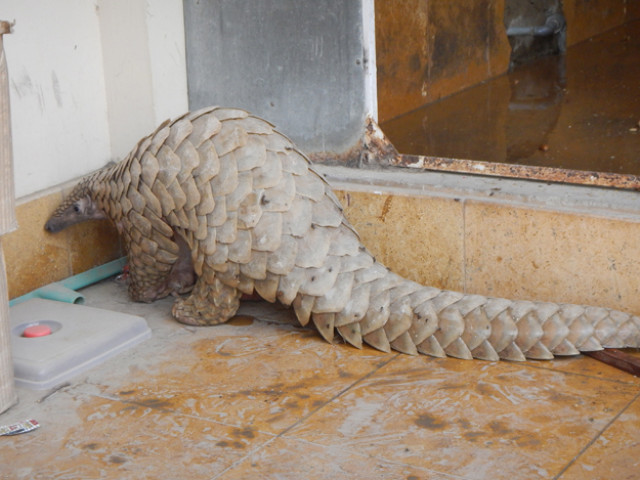Experts call for measures to save Indian pangolin from extinction in Pakistan
World Pangolin Day being observed worldwide today

Of the eight species of pangolins, the Indian pangolin, Manis crassudata, is found in Pakistan. PHOTO: COURTESY WWF-PAKISTAN
This was stated by the Worldwide Fund for Nature (WWF) technical adviser on marine programme, Muhammad Moazzam Khan, on the occasion of World Pangolin Day which will be observed today (Saturday).
Terming pangolins ' innocent animals', Moazzam said they cannot harm humans as they have very small mouths. He added that pangolins have hard scales that serve as shields against threats and they curl their bodies and roll away as a defence mechanism.
"The pangolin feeds on ants and termites and is said to control pests," Moazzam said, adding that the animal was spotted in PIB Colony in Karachi a few years ago and it was caught and released into the wild. The WWF technical adviser recalled that when he was a student in 1965, a newspaper reported that local villagers killed a beast in Jhudo, Badin, which turned out to be a harmless pangolin.
Commenting on the illegal trade of pangolins, he claimed that pangolins were currently being traded more than ivory.
3.3-million-year-old fossil of extinct anthracothere found in Pakistan
Over one million pangolins have been victims of illegal wildlife trade globally during the last decade, according to the statistics of the International Fund for Animal Welfare, said WWF Wildlife Manager Hamera Aisha. She urged the need to create awareness among the general public regarding the social and ecological significance of the species.
Of the eight species of pangolins, the Indian pangolin, Manis crassudata, is found in Pakistan in hilly and sandy areas. It has been listed as 'endangered' in the International Union for Conservation of Nature (IUCN) Red List of Threatened Species since 2009. Despite being protected under federal and provincial laws in the country, the species is rapidly declining as a result of poaching for illegal international trade, Aisha said.
Pakistan lies along a strategic air, land and sea route, forming a gateway to East Asia, which makes it a major route for illegal wildlife trade. Due to increasing demand for meat, scales and derived products, the Indian pangolin remains one of the highest trafficked animals from Pakistan.
According to the IUCN estimates, the global population of pangolin will be reduced by half in the next 21 years.
In order to protect the species against illegal trade, WWF-Pakistan has carried out several projects. Recently, it developed a national plan of action and trained more than 500 officials of law enforcement agencies to monitor illegal wildlife trade.
Sea turtles' sad fate: from restaurant menus to plastic 'soup'
According to WWF-Pakistan Sindh and Balochistan Head Dr Babar Khan, poaching, illegal hunting and trafficking of the pangolin to a few countries, including China and Vietnam, has drastically reduced its population in Pakistan.
He said the pangolin was hunted for its scales, meat and other body parts. He also mentioned that since the general public did not know about the animal, panic was created when it was found at any location as people considered it a dangerous animal. "There is an urgent need to create awareness among the general public, especially youth, because of their lack of familiarity with this animal," he said.
WWF-Pakistan Pangolins Project Manager Muhammad Waseem said WWF-Pakistan had initiated a project, 'Saving the Pangolins of Pakistan - Conservation of the Indian Pangolin through Research and Management', which will help counter the trafficking of pangolins and address its poaching and trade in Kirthar, Potohar and Azad Kashmir.
Waseem added that the project would help in the conservation of Indian pangolins by addressing critical data gaps regarding the illegal wildlife trade, weak deterrence for smugglers, lack of government resources and lack of interagency coordination.



















COMMENTS
Comments are moderated and generally will be posted if they are on-topic and not abusive.
For more information, please see our Comments FAQ